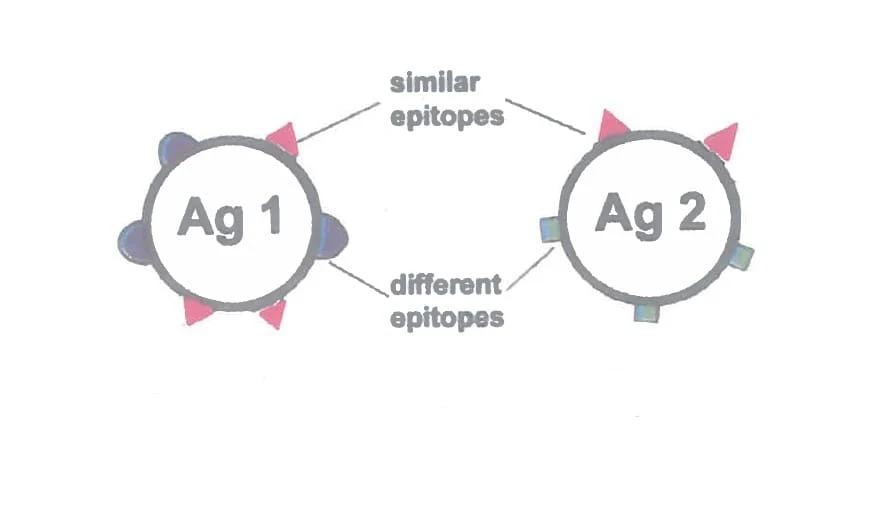An immunogen is a substance that can stimulate the immune system to produce a specific immune response (humoral and/or cell-mediated) and can react specifically with the product of this response.
An antigen, on the other hand, may or may not be able to stimulate the immune system, but it can still specifically react with the product of the immune response.
Accordingly, all immunogens are antigens, but not all antigens are immunogens; however, the terms immunogen and antigen are incorrectly used interchangeably.
Antigenic Determinants or Epitopes
- The immune system does not recognize the antigen molecule as a whole but reacts to limited parts of the molecule called epitopes.
- They are very small, composed of just four to five amino acids or monosaccharide residues.
- They determine the specificity of the antigen.
- The same antigen may possess different epitopes.
- Antigens that share one or more epitopes are known as cross-reactive (heterophil) antigens (Fig. 1).
 |
| Fig. (1): Heterophil antigens |
Hapten
This is a low molecular weight substance which is incapable of inducing an immune response alone, but when coupled with a carrier molecule (protein) it can act as an immunogen.
Examples of haptens are drugs e.g. penicillin.
Factors affecting immunogenicity
The following factors affect immunogenicity:
- Foreignness
- Molecular size
- Chemical nature
- Route of administration
- Dosage
- Adjuvants
For a substance to be antigenic, it must be foreign to the host in which it is introduced.
The immune system can normally distinguish between body components (self) and foreign substances (non-self) and is normally tolerant (non-reactive) to self-antigens (autotolerance).
2. Molecular size
Usually, the larger the molecule, the stronger the antigenicity. However, there are exceptions; e.g. insulin is a small molecule but is immunogenic and carbon particles are very large but are non immunogenic.
The chemical complexity of a molecule contributes significantly to its immunogenicity. The more complex the molecule, the more immunogenic it is.
The most potent immunogens are proteins.
4. Route of administration
The route of administration of an antigen may affect the type and intensity of the immune response. As a general rule, the subcutaneous and intramuscular routes are the best in provoking an immune response.
5. Dosage
There is an optimum dose at which any antigen is most immunogenic.
Very low or very high doses may result in a state of unresponsiveness (tolerance).
6. Adjuvants
Adjuvants are non-specific potentiators of the immune response. The administration of an adjuvant together with an antigen enhances the immune response to that antigen.
One of the commonly used adjuvants is aluminum hydroxide which is added to diphtheria and tetanus toxoids that are used for human immunization.
Additional notes:
- Immunogenicity is the ability of a substance to induce an immune response.
- An antigen is a substance that can bind to specific antibodies or T cell receptors.
- An immunogen is a substance that can induce the production of antibodies or T cells that are specific to that substance.
- All immunogens are antigens, but not all antigens are immunogens.
- The factors listed above can all affect how immunogenic a substance is.
